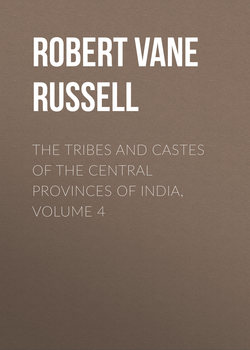Читать книгу The Tribes and Castes of the Central Provinces of India, Volume 4 - Robert Vane Russell - Страница 82
Part II
Articles on Castes and Tribes
Kumhār—Yemkala
Vol. IV
Kurmi
43. Social customs. Tattooing
ОглавлениеThe Kurmis employ Brāhmans for their ceremonies. They have gurus or spiritual preceptors who may be Brāhmans or Bairāgis; the guru is given from 8 annas to Rs. 5 when he initiates a neophyte, as well as his food and a new white cloth. The guru is occasionally consulted on some religious question, but otherwise he does nothing for his disciple except to pay him an occasional visit, when he is hospitably entertained. The Kurmis of the northern Districts do not as a rule eat meat and also abstain from alcohol, but in Chhattīsgarh they eat the flesh of clean animals and fish, and also of fowls, and drink country liquor. Old men often give up flesh and wine as a mark of piety, when they are known as Bhagat or holy. They will take food cooked with water only from Brāhmans, and that cooked without water from Rājpūts, Banias and Kāyasths as well. Brāhmans and Rājpūts will take water from Kurmis in the northern Districts though not in Chhattīsgarh. Here the Kurmis do not object to eating cooked food which has been carried from the house to the fields. This is called rengai roti, and castes which will eat it are considered inferior to those who always take their food in the chauka or purified place in the house. They say ‘Rām, Rām’ to each other in greeting, and the Raipur Kurmis swear by a dog or a pig. Generally they do not plough on the new or full moon days. Their women are tattooed after marriage with dots on the cheeks, marks of flies on the fingers, scorpions on the arms, and other devices on the legs.
